|
|
|
Sort Order |
|
|
|
Items / Page
|
|
|
|
|
|
|
| Srl | Item |
| 1 |
ID:
152414
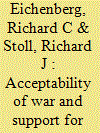

|
|
|
|
|
| Summary/Abstract |
We study the factors that influence citizen support for defense spending in fourteen democracies over the period 2004–2013. We pose two research questions. First, what factors influence citizen support for war and military force? We refer to this as the acceptability of war. Second, in addition to the acceptability of war, what other factors affect support for defense spending? Our principal finding is that citizen acceptance of war and support for defense spending are most influenced by basic beliefs and values. Gender also has a strong negative influence on attitudes toward war and thus indirectly lowers support for defense spending among women. Attitudes toward war and defense spending are also sometimes influenced by short-term threats and by alliance considerations, but the effects are not as substantively meaningful. We conclude with a summary of the results and a discussion of the implications for theory and policy.
|
|
|
|
|
|
|
|
|
|
|
|
|
|
|
|
| 2 |
ID:
132793
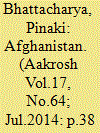

|
|
|
|
|
| Publication |
2014.
|
| Summary/Abstract |
General Boris Gromov, commander of the 40th Army of the Soviet Union, crossed the 'Friendship' bridge linking the Salang Pass on 15 February I989. hack to the motherland. Najibullah. the Afghan president and a Communist protege' of the USSR regime of Mikhail Gorbachev, was ousted from power in April 1992. The intervening three years have a story to tell to the various protagonists of the current Afghan drama being enacted right now as another superpower gets ready to decamp without completing what it set out to do. The Red Army had left in early I989, and its nominee, Najihullah. held on to power for another three years on the strength of the same Afghan army that had desertions, remained fragmented in factional lines - the Parchams and the Khalqis - and was depleted in terms of resources.
|
|
|
|
|
|
|
|
|
|
|
|
|
|
|
|
| 3 |
ID:
118723
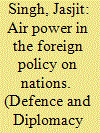

|
|
|
| 4 |
ID:
042483
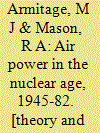

|
|
|
|
|
| Publication |
London, Macmillian, 1983.
|
| Description |
xv, 298p.
|
| Standard Number |
0333253205
|
|
|
|
|
|
|
|
|
|
|
|
Copies: C:1/I:0,R:0,Q:0
Circulation
| Accession# | Call# | Current Location | Status | Policy | Location |
| 021932 | 358.4042/ARM 021932 | Main | On Shelf | General | |
|
|
|
|
| 5 |
ID:
064562
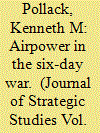

|
|
|
| 6 |
ID:
081385
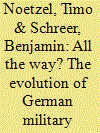

|
|
|
|
|
| Publication |
2008.
|
| Summary/Abstract |
German strategic decision-makers have to reconsider their approach to the use of force. In Afghanistan, the Bundeswehr is faced with the challenge of a growing insurgency. This situation requires a willingness to provide combat forces for the NATO-led International Security Assistance Force. Hence, the conviction in German domestic politics that the Bundeswehr should only be employed for the purposes of stabilization and reconstruction is increasingly challenged by a changing operational reality in Afghanistan, and allies' reluctance to continue to accept German policy. In essence, the issue is about German participation in counterinsurgency operations. To continue current policy undermines Germany's military credibility among allied partners and restrains Germany's ability to utilize fully military power as an instrument of policy. This article argues that while military force in recent years has become an integral part of German foreign policy to pursue national interests, political decision-makers in Berlin and the broader German public will still have to come to terms with the reality of a new security environment in Afghanistan. For the German government the 'small war' in northern Afghanistan is a very politically exhausting undertaking. Both politically and militarily Germany seems ill-prepared to sustain such an operation. Its political and strategic culture still promotes an aversion to involvement in war-fighting. In addition, the government and the Bundeswehr lack vital strategy-making capabilities. Still, there are indicators that the changing operational reality in Afghanistan might lead to a significant evolution of the German approach to the use of force
|
|
|
|
|
|
|
|
|
|
|
|
|
|
|
|
| 7 |
ID:
128682
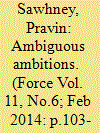

|
|
|
| 8 |
ID:
087233
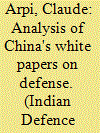

|
|
|
|
|
| Publication |
2009.
|
| Summary/Abstract |
In the white paper, informationization is mostly used for information and communication technology. The extensive repetition of the world shows an important direction in which the chinese Armed forces are engaged.
|
|
|
|
|
|
|
|
|
|
|
|
|
|
|
|
| 9 |
ID:
100729
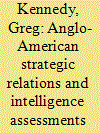

|
|
|
|
|
| Publication |
2010.
|
| Summary/Abstract |
The historiography of Western intelligence assessments of Japanese military power and prowess, particularly before the Pearl Harbor attack in December 1941, is littered with accusations of racism, ignorance, arrogance, and incompetence, which are portrayed as having created one of the most serious underestimations of a modern power's military capabilities. However, cultural and racial biases will always exist in professional military establishments because their competitiveness and emphasis on morale lead some untrained minds to undervalue systems possessing values different from their own. This article will reassess the influences of racism on Anglo-American appreciations of Japanese air power, and its development, in the seven years before the attack on Pearl Harbor.
|
|
|
|
|
|
|
|
|
|
|
|
|
|
|
|
| 10 |
ID:
092503
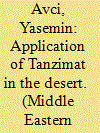

|
|
|
|
|
| Publication |
2009.
|
| Summary/Abstract |
The second half of the nineteenth century was a period when the Ottoman government's centralization efforts gained momentum. In Southern Palestine, this entailed a struggle for central government to gain the upper hand over the Bedouin tribes. In the 1860s, the Ottoman government was still using military power to end the internal strife between the Bedouin tribes. However, from the 1890s on, the government began to use sophisticated means and tactics in order to secure control and encourage the integration of the Bedouin element in the empire. The creation of a new town, namely Beersheba, the changing apparatus of administration, the construction of public buildings in desert, all meant that the government attempted to penetrate the nomad's way of life. In this study the main emphasis will be given to describing the role of the state in forming and changing the tribal institutions.
|
|
|
|
|
|
|
|
|
|
|
|
|
|
|
|
| 11 |
ID:
132400
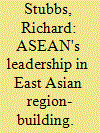

|
|
|
|
|
| Publication |
2014.
|
| Summary/Abstract |
Despite none of its members being a major economic or military power, the Association of Southeast Asian Nations (ASEAN) has played a leading role in building East Asia's regional institutions. In exploring this apparent puzzle, the analysis reviews the literature on state leadership at the regional and international level, asks why the region's major powers ceded leadership on the question of regional institution building to ASEAN, and assesses the consequences for East Asia's regional architecture of ASEAN's leadership role in institution-building. The conclusion is that leadership at the state level entails a state, or a group of states, proposing, executing and getting others to agree on a course of action to deal with a specific problem or challenge. The analysis also underscores the point that, while ASEAN has been the leader in East Asian institution-building, the Association and its members should not automatically be expected to play a leadership role on all issues preoccupying the region.
|
|
|
|
|
|
|
|
|
|
|
|
|
|
|
|
| 12 |
ID:
128001
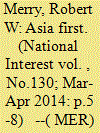

|
|
|
| 13 |
ID:
003058
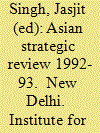

|
|
|
|
|
| Publication |
New Delhi, Institute for Defence Studies and Analysis, 1993.
|
| Description |
334p.
|
| Standard Number |
8186019014
|
|
|
|
|
|
|
|
|
|
|
|
Copies: C:2/I:0,R:0,Q:0
Circulation
| Accession# | Call# | Current Location | Status | Policy | Location |
| 034805 | 355.005095/JAS 034805 | Main | On Shelf | General | |
| 034806 | 355.005095/JAS 034806 | Main | On Shelf | General | |
|
|
|
|
| 14 |
ID:
155607
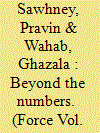

|
|
|
|
|
| Summary/Abstract |
The Indian Air Force (IAF), which was established on 8 October 1932, celebrates its 85th raising day. This is time for commemoration, reflection and perhaps some hard questions. The questions pertain to IAF’s role and capability, and how much its thinking is in sync with building India’s military power.
|
|
|
|
|
|
|
|
|
|
|
|
|
|
|
|
| 15 |
ID:
131634
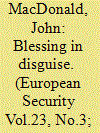

|
|
|
|
|
| Publication |
2014.
|
| Summary/Abstract |
This article examines the implications of Scottish independence for the UK's nuclear posture. It is argued here that a vote for independence will critically undermine this posture. Since the UK nuclear force operates entirely out of Scotland, and since the Scottish government continues to assert its intention to see nuclear weapons removed from an independent Scotland, it is overwhelmingly likely that a 'Yes' vote will prompt a demand for the drawdown of the UK nuclear force in Scotland. If it wished to maintain its nuclear capability, the UK government would then have to make alternative basing arrangements. It is argued here that a host of legal, financial and political difficulties may preclude any such relocation and that Downing Street may ultimately be left with little option but to surrender the UK's nuclear capability. This article concludes that far from weakening the UK, a surrendering of its nuclear posture would result in a stronger and more functional UK military footprint and would bolster the UK's standing in the international arena.
|
|
|
|
|
|
|
|
|
|
|
|
|
|
|
|
| 16 |
ID:
137306
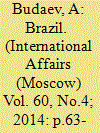

|
|
|
|
|
| Summary/Abstract |
RECENTLY, soft power as an important factor of international relations and interstate communication has come to the fore in international and Russian political discourse. At the turn of the 1990s, well-known American political scientist and neoliberal Joseph Nye, Jr. offered his now famous and widely used formula: "What is soft power? It is the ability to get what you want through attraction rather than coercion or payments"1 and specified: "The ability to affect what other countries want tends to be associated with intangible power resources such as culture, ideology and institutions."2 Later, the formula was extended to include attractive domestic policies, economic achievements and even the (American) life style and (American) values.
|
|
|
|
|
|
|
|
|
|
|
|
|
|
|
|
| 17 |
ID:
133799
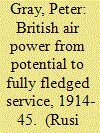

|
|
|
|
|
| Publication |
2014.
|
| Summary/Abstract |
The First World War set British air power on a path of development that by 1939 made an essential contribution to the conduct of war
At the start of the First World War, the potential of air power for military purposes had already been identified but remained largely underdeveloped, with Britain lagging behind some of its direct European competitors. Peter Gray traces how the First World War acted as a catalyst for British forces to use air power in attack and reconnaissance roles, and unleashed the potential for its further development during the interwar years. By the Second World War, air power had become an indispensable element of warfare.
|
|
|
|
|
|
|
|
|
|
|
|
|
|
|
|
| 18 |
ID:
110990
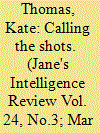

|
|
|
|
|
| Publication |
2012.
|
| Summary/Abstract |
With the death of its most recent president Malam Bacai Sanha, Guinea-Bissau has once again been plunged into turmoil and political uncertainty.Kate Thomas assesses the best-and worst case scenarios for the troubled country.
|
|
|
|
|
|
|
|
|
|
|
|
|
|
|
|
| 19 |
ID:
057877
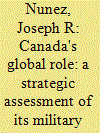

|
|
|
| 20 |
ID:
063989
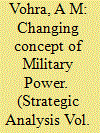

|
|
|
|
|
|
|
|